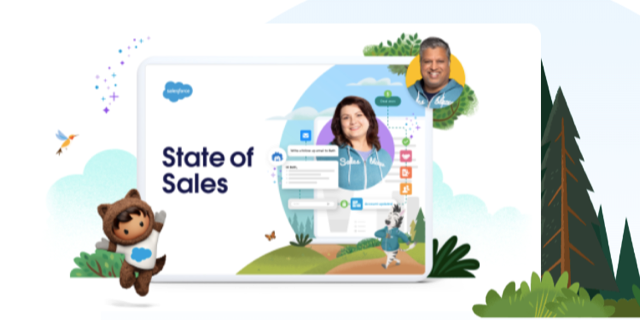AI + data + CRM tech major Salesforce has released the new State of Sales report, sharing insights from 5,500 sales professionals across 27 countries — including 300 from India. The report highlights how sales teams are balancing technological advancements and building trusted customer relationships as they seek growth in a crowded marketplace.
Key insights from the research include:
- AI Adoption Surges, But Trust and Data Gaps Linger. Sales adoption of AI is climbing as teams push for productivity and personalization, but concern regarding integration, security, and customer distrust mean the technology’s full potential for the profession has yet to be seen.
- 89% of sales teams in India have fully implemented or are experimenting with AI. An additional 10% of teams are evaluating the technology.
- The top sales benefit from AI in India is data quality/accuracy.
- Top obstacle sales teams in India encounter while implementing AI are security concerns.
- Reps Struggle Finding Time to Meet Customer Expectations. Changing customer expectations is the #1 sales challenge worldwide, but it’s hard finding the time to connect.
- Sales reps in India spend an average of just 27% of the work-week connecting with customers.
- 65% of sales professionals in India say changing customer expectations are more of a challenge than last year; only 7% say it’s less of a challenge.
- Employee Retention Is Rising Globally. As labor markets tighten, sales employees are largely staying put. Globally, teams report 18% average staff turnover over the last 12 months — down from 25% in 2022. However, employee retention trends vary by region.
- 34% is the average estimated staff turnover rate in India over the past year.
- 12% of sales professionals in India are currently looking to change jobs.
Reps say selling has gotten more challenging amid heightened competition:
Across most sales organizations, revenue growth isn’t keeping pace with company goals. Worldwide, sales professionals say rising customer demands and competition are their top obstacles. Fifty-seven percent of sellers say competition has gotten more challenging since last year, and only 13% say it’s gotten easier.
Non-selling tasks pull reps away from customer relationship building:
Competition isn’t the only obstacle to sales. Non-selling tasks, such as administrative work and meeting preparation, consume 70% of reps’ time. Without time carved out for critical selling efforts, reps struggle to connect with customers.
B2B buyers specifically have flagged this disconnect. Eighty-six percent say they’re more likely to purchase when companies understand their goals, yet non-selling work may be getting in the way: 59% of buyers say reps don’t take the time to understand their business’ unique challenges and objectives.
“Deep relationships with customers are the difference-makers when it comes to challenging sales environments,” said Ketan Karkhanis, EVP and GM of Sales Cloud at Salesforce. “B2B buyers are more likely to purchase when reps act as trusted advisors. However, too often, deep knowledge of customer need and opportunity is lacking or not effectively communicated. That makes it difficult to build trust, derailing deals.”
Sellers see accuracy, personalization benefits from AI despite adoption hurdles:
In a climate of heightened competition and scarce hours in the day to sell, many sales teams are looking to AI for support. Currently, 40% of sales organizations are experimenting with AI, and an additional 41% say they have the technology fully implemented in their operations. Of course, given the exceptionally rapid pace at which AI is evolving, whether teams consider their current implementations complete may change in the future.
Regardless, the benefits of AI for sales teams are clear and growing. For example, 80% of reps working on teams using AI say it’s easy to get the customer insights they need to close deals, compared to just 54% at orgs without AI.
When asked to name where AI has had the biggest impact, sales professionals point to five key areas:
- Sales data quality and accuracy: From error detection to automatically updating deal records, AI can ensure data is up-to-date and free from human error.
- Understanding customer needs: AI can analyze customer feedback from a variety of sources to gauge customer sentiment and identify areas of need before a sales rep presents a solution.
- Personalization for customers: Sales teams can leverage predictive analytics to forecast a buyer’s future order based on past purchases, provide recommendations to upsell, and more.
- Sales forecasting accuracy: From highlighting pipeline red flags to projecting closed deals, AI can deliver insights to help shape revenue-generating sales strategies.
- Prospect/customer communications: Teams are tapping generative AI grounded in trusted customer data to write personalized emails to prospects — saving time trying to craft a message manually.
There are some obstacles to successful AI implementation, however:
- A third (33%) of sales operations professionals using AI say their teams lack resources or headcount to support the new technology, while another 33% cite insufficient employee training as an adoption hurdle.
- Data — the foundation of effective AI models — is also a concern. Only 35% of sales professionals completely trust the accuracy of their organization’s data.
Sales teams are taking action to address these obstacles. Fifty-three percent of sales teams that have fully implemented AI first consolidated their tech stack, which helps streamline data. Nearly the same amount (51%) implemented additional data security measures.
Arun Kumar Parmeswaran, Managing Director – Sales, Salesforce India said, “We are committed to empowering sales teams to navigate the complexities of today’s market by utilizing cutting-edge technologies and nurturing trusted customer relationships. Our State of Sales report highlights the essential balance between innovation and trust. With 89% of sales teams in India adopting AI, it’s evident that the future of sales is becoming more data-driven and personalized. However, the journey extends beyond mere adoption; addressing security concerns and fostering customer trust are crucial. By concentrating on these aspects, we can fully harness AI’s potential to enhance customer interactions and drive sustainable growth.”
Salesforce conducted a double-anonymous survey of 5,500 sales professionals between March 8 and April 18, 2024. Respondents were sourced from 27 countries across North America, Latin America, Asia-Pacific, and Europe. Additional methodology and survey demographic details can be found in the report.
- Download the full State of the Sales report

















